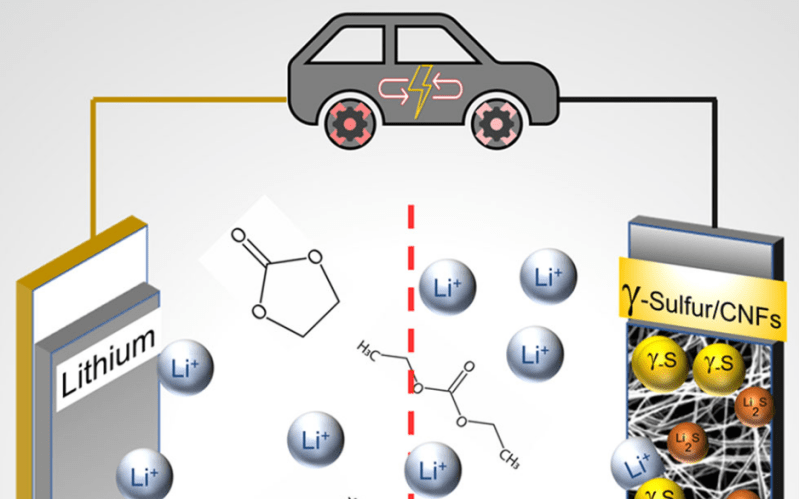Lithium sulfur batteries are often touted as the next major chemistry for electric vehicle applications, if only their cycle life wasn’t so short. But that might be changing soon, as a group of researchers at Drexel University has developed a sulfur cathode capable of more than 4000 cycles.
Most research into the Li-S couple has used volatile ether electrolytes which severely limit the possible commercialization of the technology. The team at Drexel was able to use a carbonate electrolyte like those already well-explored for more traditional Li-ion cells by using a stabilized monoclinic γ-sulfur deposited on carbon nanofibers.
The process to create these cathodes appears less finicky than previous methods that required tight control of the porosity of the carbon host and also increases the amount of active material in the cathode by a significant margin. Analysis shows that this phase of sulfur avoids the formation of intermediate fouling polysulfides which accounts for it’s impressive cycle life. As the authors state, this is far from a commercial-ready system, but it is a major step toward the next generation of batteries.
We’ve covered the elements lithium and sulfur in depth before as well as an aluminum sulfur battery that could be big for grid storage.
















This dates back to Feb. 2022. Maybe a newer status would be good to have: has anyone else be able to reproduce their enormous claims ?
Can you reproduce it commercialize 10000 cycles
This article is not best placed with this website but better placed with some superficial tech news site.
On this website it just functions as filler imo.
But of course the peanut gallery will argue it’s a hack etc etc. To them I say: BS.
Chemistry can have hacks just like any other.
Well there you go.
And now what.
We have a website visited by people who like to read about hacks.
And then articles show up about cutting edge science which is not proven and are essentially too dangerous to hack about with because it’s Lithium battery chemistry which can explode if done wrongly and requires state of the art manufacturing methods.
“The team at Drexel was able to use a carbonate electrolyte like those already well-explored for more traditional Li-ion cells by using a stabilized monoclinic γ-sulfur deposited on carbon nanofibers.”
What is the added value of this article to the reader from the perspective of hacking?
Of course people may still find it all very interesting. BUT is it a hack?
Or is it just filler?
Met the guys at Oxis Energy a few years ago. There was lots of promise but seems a general failure to deliver Lithium Sulphur batteries:
https://www.electrive.com/2021/05/21/oxis-energy-is-facing-bankruptcy/
Shame, seemed like a nice bunch.
These battery inventions show up every few months like clockwork, but they never really materialize into anything because there’s always something wrong with it.
Like in this case, the sulfur starts to break down at 119 C which means the battery goes easily into thermal runaway when overloaded, or in case of a fire. While the theoretical energy density for the active materials is around 1.3 kWh/kg the practical energy density after you wrap it up in metal cylinders and assemble it into a battery with all the shielding and cooling and whatnot, it’s not going to be significantly better than what already exists – just slightly less fire-safe.
Silicon anode & sulfur cathode is one of the best combination…previously usage of sulfur suffered a short life battery cycle..now with this new monolithic sulfur phase, it looks promising as energy density will be higher than standard li-ion battery…cost also will be much lower since they can eliminate/reduce rare and expensive metal like cobalt, nickel, manganese
There is already a company called Li-S Energy that has resolved most of the issues of using this technology and are currently building a small production facility to demonstrate its batteries.
” Analysis shows that this phase of sulfur avoids the formation of intermediate fouling polysulfides which accounts for it’s impressive cycle life.”
https://www.youtube.com/watch?v=zXP_pr7np-o
or https://www.fourmilab.ch/documents/apostrophe/